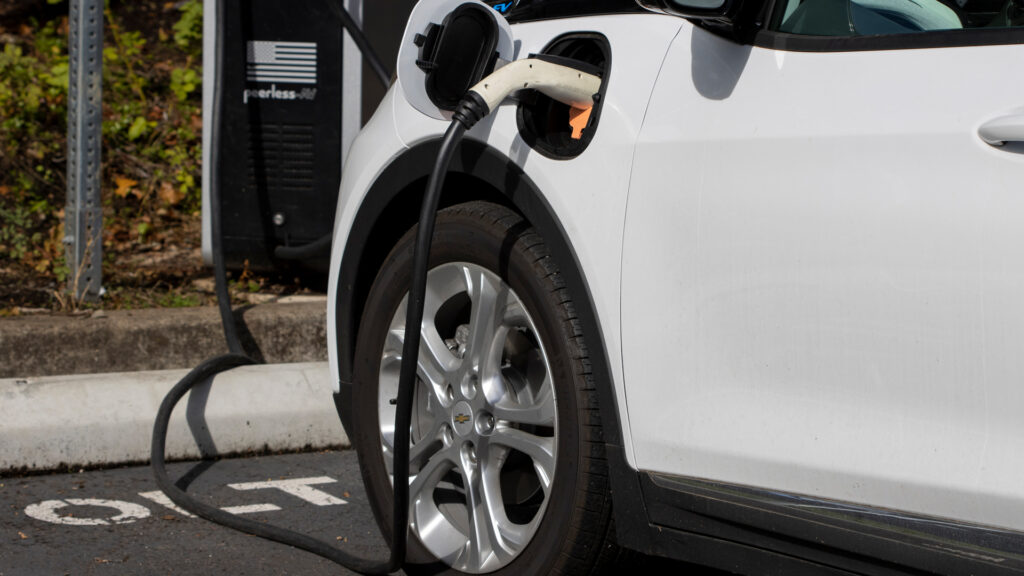By Ali DySard, Environmental Defense Fund
Why are we talking about a punitive new EV annual fee?
The citizens of Florida have embraced the electric vehicle (EV) revolution with the second-highest number of registered EVs in the nation at 7%. Residents of the Sunshine State are clearly eager to take advantage of the cost savings that switching to an EV can provide. However, the Florida Legislature is suggesting a bill that would single out EV owners with a punitive new tax.

Traditionally, revenue from the state’s gas tax has funded Florida’s road maintenance, but with EV sales projected to make up between 40% and 50% of all vehicle sales by 2030, the amount available in the state’s coffers will be reduced. It’s imperative that new state road funding taxes align to ensure that we both maintain our roads and that we also treat Floridians justly.
Unfortunately, as filed, Senate Bill 28 and House Bill 107 would create a punitive flat annual license tax for EV owners of $200 — almost 40% higher than what a current average gas vehicle pays annually at the pump. A University of South Florida study found that, on average, gasoline vehicle drivers contribute around $125 to $146 each year for road maintenance to the State Transportation Trust Fund through gas taxes.
As proposed the $200 annual tax for EV owners exceeds this by over $50 and significantly departs from the existing usage-based model, resulting in a disadvantage for EV owners. Indeed, this flat tax means that whether Florida families driving EVs go 20 miles or 20,000 miles they will be paying the same annual road use tax. Additionally, when 40-50% of all vehicles transition to EVs, it would mean that nearly half of Florida’s 137 million annual tourists, who are exempt from the tax, would fail to participate in the financial support of road maintenance, putting the burden of road and highway maintenance solely on Florida residents.
Florida stands to benefit from the significant reductions in health-harming and climate-worsening pollution that EVs will provide. We have an opportunity to make economically sound policy decisions that will ready the Sunshine State for the changing landscape of our transportation future. While an equitable solution is needed, Senate Bill 28 risks preventing the realization of these deep benefits, in addition to violating the fundamental principle that everybody should pay an equal share by requiring EV drivers to pay more.

The truth is by 2030, 87% of Florida’s projected revenue shortfall for the State Transportation Trust Fund is not from increased EVs on the road, but rather driven by stagnant federal gas rates and increased costs for road construction and materials. During the last 10 years, relying on gas taxes has proven insufficient for the construction and upkeep of roads and highways.
At the very least, any new tax imposed on EV owners should not exceed the expenses that these drivers would pay for an equivalent gas vehicle. This is especially important if the extra funds are not directed to beneficial EV ends, such as supporting the state’s Electric Vehicle Infrastructure Master Plan, bolstering emergency charging infrastructure or guaranteeing secure hurricane evacuation routes, as Alabama and other states have done.
Finding the right balance between promoting fuel efficiency and funding essential infrastructure is of critical importance to ensure the transportation sector is ushered into the modern era. Florida can’t be truly free if consumer choice is met with punitive taxes. The correct approach should be one that is balanced and based, at least in part, on who and how intensively they are using our roads.
For the sake of our economy and the wallets of citizens, it is imperative that we craft this policy carefully to uphold Florida’s values and continue our country-leading growth in electric vehicles.
Ali DySard is an Environmental Defense Fund senior program specialist. Ali focuses on advancing the adoption of medium and heavy-duty electric vehicles, EV infrastructure and state and local policy in Florida. Ali is a Fort Myers native with a degree in environmental Science from the University of Washington, Seattle.
This opinion piece was originally published by the Orlando Sentinel, which is a media partner of The Invading Sea. If you are interested in submitting an opinion piece to The Invading Sea, email Editor Nathan Crabbe at ncrabbe@fau.edu. Sign up for The Invading Sea newsletter by visiting here.




Commonsense isn’t being applied with regard to this proposed tax. I have read many comments (on previous posts) regarding how much environmental damage EVs are doing as compared to ICE vehicles. I can only say that is is PURE FUD (Fear, Uncertainty, and Doubt). It is being spread maliciously by the oil and gas industry! I have spent the past 4+ years driving an EV. I have spent the past 6+ years researching the issues that surround EV ownership including the blatant lies spread by the oil and gas industry about how EVs use more fossil fuels over their lifetime, they damage the roads more, they cause more damage in an accident, and the list of FUD goes on and on! If people will take the time to research the issues logically instead of reacting emotionally, they will find the information they need to find to make informed decisions. SB 28 is patently unfair in a world where everyone is preaching “pay their fair share!” This can be proven logically and scientifically!